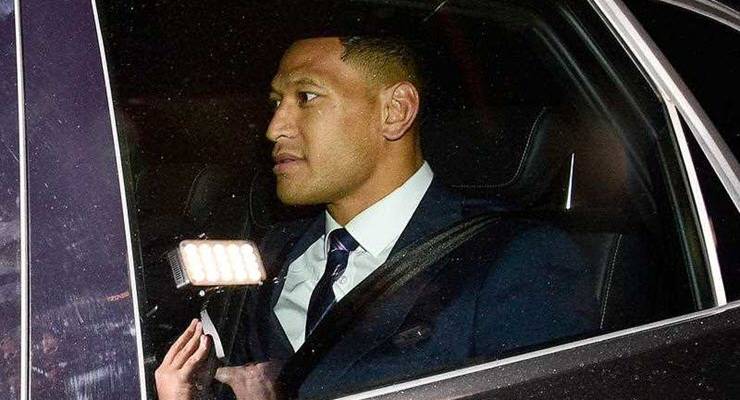
How does News Corp decide when a religious public figure should be free to say what they want? Looking at recent examples, it depends on who’s speaking — and what religion they belong to.
This week the prime minister was asked about his “personal beliefs” on the LGBTIQ community, before being asked directly “do gay people go to hell?”.
After largely evading the question first time around, Morrison later clarified he does not believe gay people go to hell and went on to chastise Bill Shorten’s response as a “cheap shot” on his religion. Today the self-appointed free speech advocates in The Australian are going in to bat for him; there are numerous reports on Labor’s apparent attacks on faith, as well as commentary casting Morrison as a victim alongside similar writing on Israel Folau.
But what happens when the subject of such complaints isn’t a conservative Christian? And when exactly does a public figure’s religious background matter?
We hear more about the faith and religious backgrounds of Muslim politicians and public figures than most others, and their faith regularly becomes front and centre when they are perceived to transgress. In politics, we’ve seen this with federal Labor MP Anne Aly and NSW Greens Senator Mehreen Faruqi. In media, The Project’s Waleed Aly is a regular target. Yassmin Abdel-Magied was subject to a hugely damaging media campaign and ultimately hounded out of the country for expressing (and quickly apologising for) her views — “Lest we forget (Manus, Nauru, Syria, Palestine)”. Her Muslimness was regularly used to frame the Australian engineer and author as “other”.
At the more extreme end of the scale, when it surfaced in 2016 that Australian-Muslim cleric Sheik Shady Alsuleiman made comments about AIDS being divine punishment for gay people in a sermon, the condemnation was swift; there were demands that the broader Muslim community make distancing statements. Malcolm Turnbull, the prime minister at the time, quickly denounced him and said he regretted inviting him to a dinner in Kirribilli. Alsuleiman also said gay people were responsible for “spreading diseases” and attracting “evil outcomes to our society”.
Compare this to the treatment of Israel Folau: there have been no calls on Christians to disavow the rugby union star. In fact, many have come out swinging in his defence, saying it would be wrong for Rugby Australia to rip up his contract. The issue was elevated from one of contractual law to one of free speech, and Folau was defended by high-profile commentators on 2GB, and in The Daily Telegraph, The Herald Sun and The Australian.

In a recent opinion piece, Rita Panahi defended Folau’s right to share his views:
As an atheist, who Israel Folau has declared is hell-bound, I disapprove of what he shared on social media but I will defend his right to share it.
She was not as lenient on Alsuleiman and did not invoke his right to free speech in 2016:
Tolerating hateful, backward attitudes in the name of cultural diversity is cowardly and ultimately counter-productive.
One could argue Folau is something of a special case. After all, he doesn’t hold any formal representative role or office. But the same principles hold wherever you look: the Christian Democratic Party’s Fred Nile called homosexuality “unnatural, immoral, unhealthy and sinful”, and got himself a lovely profile piece in the Weekend Australian’s magazine.
It’s not news that there’s a lack of consistency on this issue — from both sides of the ideological and political divide — but it’s important to keep in mind as certain politicians and sections of the media cast a spotlight on it right before the election. Free speech, according to the outlets that have made free speech their crusade, is only free for some.








“We will decide who as free speech and the circumstances in which they exercise it.”
That’s why most Australians need protection from religion.
I ask Scoundrel Morrison do religious kiddie fiddlers go to hell as well?
The ancient Canaanite tribe that worshipped El, Baal and Yaweh, amongst other gods left a set of stories of their ‘dreamtime’. Thousands of years later a large number of people still adhere to these ‘dreamtime’ stories that were written up by various authors over time and translated from various languages into the bible. The bible is according to Christians is ‘the word of god’ and must believed – (except for most of the old testament and some embarrassing bits of the new testament.) But never the less, it is all to be taken seriously, except the bits about Yaweh enjoying the smell of burning blood on his altars and other bits like that.
I’m with Ricky Gervais – He has said that Hindus, as an example, have hundreds of gods. So, if there are say 2000 gods in the world today that Christians don’t accept, then ‘Gervaisians’ have a lot in common with Christians. The only difference between between us and a Christian is that we don’t believe in 2001.
Freedom from religion.
I’ve never understood why a politicians claiming to have a sky fairy friend who tells them what to do, who to abhor & what not to do in bed isn’t laughed off the stage.
I agree with those above – what we need is freedom FROM religion, especially in the public sphere of government policy.
Religious indoctrination is child abuse.